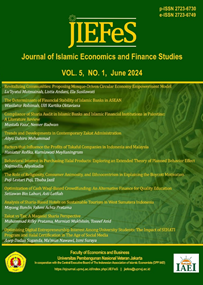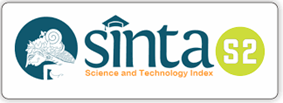The Role of Religiosity, Consumer Animosity, and Ethnocentrism in Explaining the Boycott Motivation
DOI:
https://doi.org/10.47700/jiefes.v5i1.7755Keywords:
Animosity, Ethnocentrism, Motivation Boycott, ReligiosityAbstract
The protracted conflict between Israel and the Palestinian Hamas group, culminating with an Israeli offensive in October 2023, has caused significant suffering to the Palestinian people. The response to the attack, including international support and a fatwa from the Indonesian Ulema Council (MUI), has prompted Indonesians to boycott products linked to Israel. This study aims to investigate the effect of religiosity, animosity and ethnocentrism on the motivation for boycotting Unilever Indonesia products related to the company's commitment to Israel, focusing on these factors. This type of research is quantitative descriptive with the SEM-PLS approach. The application used is SmartPLS version 4.0.0 with sample data used by 162 respondents through the distribution of questionnaires. The results show that the variables religiosity, consumer animosity and ethnocentrism have a positive and significant influence on the motivation to boycott Unilever Indonesia products. These findings highlight the importance of paying attention to psychological and social factors in the analysis of consumer behavior and their impact on companies and society at large. It also suggests that companies must take into account the social and political implications of their policies, as well as understand the values and beliefs underlying consumers' motivations for boycotting.
References
Abdullah, Z., Anuar, M. M., & Yaacob, M. R. (2021). The Effects of Religiosity and Attitude on Consumer Boycotts. International Journal of Academic Research in Business and Social Sciences, 11(18). https://doi.org/10.6007/ijarbss/v11-i18/11432
Abosag, I., & Farah, M. F. (2014). The influence of religiously motivated consumer boycotts on brand image, loyalty and product judgment. European Journal of Marketing, 48(11–12), 2262–2283. https://doi.org/10.1108/EJM-12-2013-0737
Ali, B. J. (2021). Impact of consumer animosity, boycott participation, boycott motivation, and product judgment on purchase readiness or aversion of Kurdish consumers in Iraq. Journal of Consumer Affairs, 55(2), 504–523. https://doi.org/10.1111/joca.12350
Atilgan, K. Ö., & Koken, Y. (2022). TÜKETİCEtnosentri̇zmi̇ VTüketi̇ci̇ Düşmanliğinin Sosyal Medyada BoykotEtki̇si̇. Çukurova Üniversitesi Sosyal Bilimler Enstitüsü Dergisi, 31(1), 292–307. https://doi.org/10.35379/cusosbil.1058221
Awaludin, A. A., Al-Khaidar, M. A., & Ratnasari, R. T. (2023). Opinion Leaders and Product Boycott Intentions: Factors Influencing Consumer Behavior in Support of Israel Boycott. Journal of Digital Marketing and Halal Industry, 5(2), 243–264. https://doi.org/10.21580/jdmhi.2023.5.2.20166
Barakat, A., & Moussa, F. (2017). Using the Expectancy Theory Framework to Explain the Motivation to Participate in a Consumer Boycott. Competition Forum, 14(1), 162.
Bayir, T., & Osmanoglu, H. (2022). A Study on Consumer Animosity, Negative WOM (nWOM), and Boycott Behaviours of Rival Football Fans. Sosyoekonomi, 30(53), 227–242. https://doi.org/10.17233/sosyoekonomi.2022.03.12
Chapa, S., & Hernandez, M. (2014). Hope As a Mediator of Ethnoccentrism Among Hispanics : the Post Analysis of the Nothing Gringo Boycott of 2006. International Journal of Economic and Business Management, 2(April), 10–18.
Elida, S. S., Hasyim, Mahmud, & Hanfan, A. (2016). The Trends Of Indonesian Consumer Ethnocentrism as a Reference for International Marketer.
Fakriza, R., Nurdin, R., Manajemen, M. J., Ekonomi, F., Bisnis, D., Syiah Kuala, U., & Dosen, ). (2019). Pengaruh Religiusitas terhadap Boikot dengan Loyalitas Merek Sebagai Variabel Moderasi pada KFC Banda Aceh. Jurnal Ilmiah Mahasiswa Ekonomi Manajemen, 4(1), 206–216.
Hair, J. F., Hult, G. T. M., Ringle, C. M., & Sarstedt, M. (2017). A Primer on Partial Least Squares Structural Equation Modeling (PLS-SEM). Thousand Oaks. Sage, 165.
Hair, J. F., Sarstedt, M., Hopkins, L., & Kuppelwieser, V. G. (2014). Partial least squares structural equation modeling (PLS-SEM): An emerging tool in business research. European Business Review, 26(2), 106–121. https://doi.org/10.1108/EBR-10-2013-0128
Harahap, L. K. (2018). Analisis SEM (Structural Equation Modelling) Dengan SMARTPLS (Partial Least Square). Fakultas Sains Dan Teknologi Uin Walisongo Semarang, 1, 1.
Henseler, J., Ringle, C. M., & Sarstedt, M. (2015). A new criterion for assessing discriminant validity in variance-based structural equation modeling. Journal of the Academy of Marketing Science, 43(1), 115–135. https://doi.org/10.1007/s11747-014-0403-8
Herianto, H., Lala, A. A. T., & Nurpasila, N. (2021). Perilaku Konsumsi Sebelum dan Selama Pandemi Covid-19 di Indonesia: Studi Perbandingan. Journal of Islamic Economics and Finance Studies, 2(1), 94. https://doi.org/10.47700/jiefes.v2i1.2808
Indiraphasa, N. S. (2023). Soal Boikot Produk Israel, Akademisi Jelaskan Pengaruh Fatwa MUI ke Masyarakat. NU Online.
Investing.com. (2023). Unilever Indonesia Tbk (UNVR). Investing.Com.
Ishak, S., Khalid, K., & Sulaiman, N. (2018). Influencing consumer boycott: between sympathy and pragmatic. Journal of Islamic Marketing, 9(1), 19–35. https://doi.org/10.1108/JIMA-05-2016-0042
Jazil, T., & Arham, Q. (2021). MANFA ’ AH Journal of Islamic Business and Management Society ’ s Perspective on the Waste Bank impact toward Economic , Social , and health. 1(September), 1–12. https://doi.org/10.1009/JIBM-10-2019-0005
Jonathan, G., & Anondho, B. (2018). Perbandingan Antara Pls Sem Dan Analisis Faktor Untuk Identifikasi Faktor Pengaruh Eksternal Proyek. JMTS: Jurnal Mitra Teknik Sipil, 1(2), 123. https://doi.org/10.24912/jmts.v1i2.2668
Kalliny, M., Minton, E. A., & Benmamoun, M. (2018). Affect as a driver to religious-based consumer boycotts: Evidence from qualitative and quantitative research in the United States. In International Journal of Consumer Studies (Vol. 42, Issue 6). https://doi.org/10.1111/ijcs.12450
Khoiruman, M., & Wariati, A. (2023). Analisa Motivasi Boikot (Boycott Motivation) Terhadap Produk Mc Donald Di Surakarta Pasca Serangan Israel Ke Palestina. 2700, 247–257.
Kock, N., & Hadaya, P. (2018). Minimum sample size estimation in PLS-SEM: The inverse square root and gamma-exponential methods. Information Systems Journal, 28(1), 227–261. https://doi.org/10.1111/isj.12131
Larasati, A., Hati, S. R. H., & Safira, A. (2018). Religiusitas dan Pengetahuan Terhadap Sikap dan Intensi Konsumen Muslim untuk Membeli Produk Kosmetik Halal. Esensi: Jurnal Bisnis Dan Manajemen, 8(2). https://doi.org/10.15408/ess.v8i2.7459
Lee, R., Lee, K. T., & Li, J. (2017). A memory theory perspective of consumer ethnocentrism and animosity. European Journal of Marketing, 51(7–8), 1266–1285. https://doi.org/10.1108/EJM-03-2014-0188
Mangnale, V., Potluri, R. M., & Degufu, H. (2011). A Study on Ethnocentric Tendencies of Ethopian Consumers. Asian Journal of Business Management, 3(4), 241–250.
Mia Sari. (2022). Examination of Muslim Zilennial Consumers’ Intentions to Eat at Popular Restaurants. Maqasid Al-Shariah Review, 1(1). https://doi.org/10.58968/msr.v1i1.260
Mirza, F., Ashraf, S., & Jahangir, H. B. (2020). The Impact of Religiously Motivated Consumer Boycotts on Product Judgment, Brand Image and Loyalty. International Journal of Academic Research in Business and Social Sciences, 10(11). https://doi.org/10.6007/ijarbss/v10-i11/7902
Muhamad, N., Khamarudin, M., & Fauzi, W. I. M. (2019). The role of religious motivation in an international consumer boycott. British Food Journal, 121(1), 199–217. https://doi.org/10.1108/BFJ-02-2018-0118
MUI. (2023). Fatwa Terbaru MUI Nomor 83 Tahun 2023: Mendukung Agresi Israel ke Palestina Hukumnya Haram. MUI Digital.
Nugroho, A. R. A. (2018). Pengaruh Penilaian Produk Terhadap Keengganan Pembelian Pada Boikot Pengaruh Penilaian Produk Terhadap Keengganan Pembelian Pada Boikot Coffee Shop Abstrak Pendahuluan. December, 12. https://doi.org/10.13140/RG.2.2.10800.81927
Nurhasah, S., Munandar, J. M., & Syamsun, M. (2018). Faktor-Faktor yang Mempengaruhi Minat Beli Produk Makanan Olahan Halal pada Konsumen. Jurnal Manajemen Dan Organisasi, 8(3), 250–260. https://doi.org/10.29244/jmo.v8i3.22473
Pramudya, R. M., & Rahmi, M. (2022). Pengaruh Literasi Asuransi, Religiusitas, dan Kualitas Pelayanan terhadap Minat Generasi Milenial Menggunakan Asuransi Syariah. Journal of Islamic Economics and Finance Studies, 3(1), 70. https://doi.org/10.47700/jiefes.v3i1.4350
Pratiwi, B., Miftahul Jannah, K., Saraswati, R., Raihanah, S., & Suhud, U. (2021). Analisis Pengaruh Intention to Boycott pada Konsumen Produk Perancis di Indonesia. 2(1), 6.
Rahmawati, S., Ali, S., Subagja, G., Bisnis, I. A., & Lampung, U. (2020). Pengaruh Nilai Religiusitas Dan Pengetahuan Produk Terhadap Keputusan Boikot Produk KFC (Studi Pada Konsumen Muslim Bandar Lampung). Jurnal Kompetitif Bisnis, 1(1), 39–49.
Sarwono, J. (2019). Quantitative, Qualitative and Mixed Method Educational Research Methodology. In Hidayatul Quran Brass (Issue May).
Simamora, H. (2023). Investor Behavior on Israeli-Palestinian War and Current Money Market Uncertainty. 14(2), 31–41.
Sinkovics, R., & Holzmuller, H. (1994). Ethnocentrism- a key determinant in international corporate strategy formulation? EIBA International Conference, 1–12.
Suhud, U. (2018). The Impact of Consumer Animosity on Purchase Unwillingness in a Boycott of Sari Roti. Binus Business Review, 9(2), 87–94. https://doi.org/10.21512/bbr.v9i2.4060
Sukesti, F., & Budiman, M. (2014). the Influence Halal Label and Personal Religiousity on Purchase. International Journal of Business, Economics and Law, 4(1), 2012–2015.
Suryadi, P. B., & Bahrul, H. (2021). RELIGIUSITAS Konsep, Pengukuran, dan Implementasi di Indonesia.
Tian, S. (2010). BUY OR BOYCOTT? AN EXAMINATION OF MEDIATED CONSUMER ANIMOSITY EFFECTS ON PURCHASE INTENTIONS. Το Βημα Του Ασκληπιου, 9(1), 76–99.
Wuryanti, L., Mufahamah, E., Dewi, P. A., Fitria, A., & Hasibuan, K. (2017). PROFIT AND LOSSES OF BOYCOTTING UNILEVER PRODUCTS (PANCASILA ECONOMIC AND MASLAHAH PERSPECTIVE). 08(01), 2588–2593
Downloads
Published
Issue
Section
License
Copyright (c) 2024 Puji Lestari Puji, Thuba Jazil

This work is licensed under a Creative Commons Attribution 4.0 International License.
Authors who publish with this journal agree to the following terms:
- Authors retain copyright and grant the journal right of first publication with the work simultaneously licensed under a Creative Commons Attribution 4.0 International License that allows others to share the work with an acknowledgment of the work's authorship and initial publication in this journal.
- Authors can enter into separate, additional contractual arrangements for the non-exclusive distribution of the journal's published version of the work (e.g., post it to an institutional repository or publish it in a book), with an acknowledgment of its initial publication in this journal.
- Authors are permitted and encouraged to post their work online (e.g., in institutional repositories or on their website) before and during the submission process, as it can lead to productive exchanges, as well as earlier and greater citation of published work.

This work is licensed under a Creative Commons Attribution 4.0 International License.











